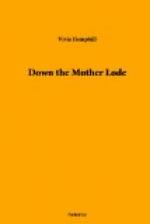“’Tis the regular price everywhere. I’ll be back soon.” After the meal John went to, the barbecue, imbibing rather freely of the fire-water barrel and making a night of it.
Heavy travel continued over the bridge all afternoon — a prairie schooner with three oxen, two mules and a bronco pulling it; a prospector in his red flannel undershirt, driving a laden donkey; a hurdy-gurdy troupe on its way to the barbecue; a stage-coach drawn by six half-broken wild horses; an old Spanish settler on a beautiful, black thoroughbred; a late arrival from Oregon, mounted upon a sturdy mule with his young wife upon a pillion behind him, and a whole drove of China-men being taken out to work a white man’s claim up on the Divide.
There passed Welch miners, who were to be the fore-runners of quartz mining; miners from Australia, who were to replace the wooden “bateas” of the Mexicans with the rocker and the iron gold-pan, and the term of “specimen” with “nugget.”
Finally came a hale, old voyaguer whom Longley greeted heartily as he swung open the toll gate:
“Greetings, Monsieur Francois Gendron, and from whence came you today?” The big Frenchman handed over the “six-bits” toll for himself and his horse.
“From New Helvetia.”
“Ah — Sacramento.”
“And I am bound for the North Fork Dry Diggings.”
“Auburn?” smiled Longley.
“Bah! the new names! In my day we called them differently. I came across the Rockies in ’32, Monsieur. But I must be en route — here are sheep coming.”
After the sheep were counted and gone, Longley glanced scowlingly across the bridge and hastily closed the tollgate. A band of Indians, several on ponies but most of them on foot, crossed the bridge and halted before him.
“Go back, ye varmints!” growled Longley.
“No Indian pay,” said the old chief. “He go the bridge and the road — no pay.”
“Well, the Chinamen paid.”
“But the Indians, no! No pay. Me go Whiskey Bar — big pow-wow. Plenty ox, plenty bear meat, plenty firewater — "
“You go back!” roared the tollkeeper, swearing, “and go ford the river. That’s good enough for a Digger! The ferry’s been taken off, but the water is not so high.”
The old Indian scowled, and the young bucks began a guttural complaint which he silenced with a gesture and a grunt of command.
“Water is cold, and those,” pointing to the sheep, “have passed.”
“You go back, I tell you! I hate every filthy brute of you! My best pal was sent to glory in that funeral fire on Murderer’s Bar, and no Indian will ever get aught from me.”
“Me pay,” said the Indian leader slowly, “Me pay cayuse, me pay boy.”
“No, you won’t pay! You’ll go back and wade the river like the low beasts that you are.”
The chief began a fierce oration. Longley ran into the tollhouse and came out with a sawed-off shotgun.




